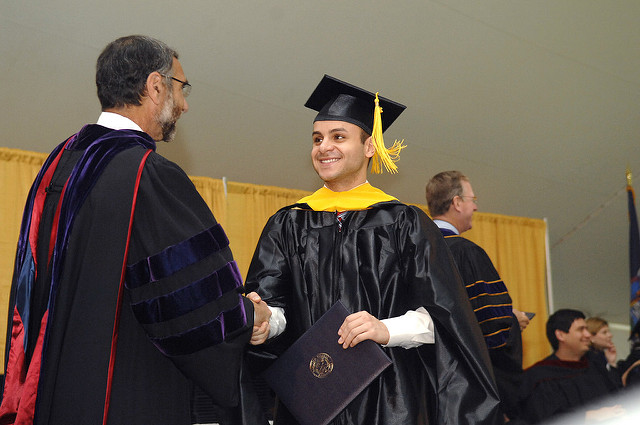The Happy State of College Graduates
Does a degree automatically make you happy? Grads who are struggling to find work might not agree, but research shows that in the long term, a college degree offers the potential for lifelong bliss, and a growing economic recovery is poised to support that. Health, happiness, and a positive economic outlook mean that the future is bright for today’s college students.
Life’s Better With a College Degree
Five out of the 10 happiest states in the nation are also in the top 10 for educational attainment. Colorado, Minnesota, Vermont, New Hampshire, and Massachusetts all took top marks in the Gallup-Healthways Well-Being Index. They are also among the top 10 states that boast the highest percentages of population with a bachelor’s degree or higher. And the nation’s happiest state, Hawaii, isn’t struggling with educational attainment, either, ranked at No. 15 with nearly 30% of its population backed by four-year degrees.
Is it a coincidence? Bryan Cohen, author of The Post-College Guide to Happiness, thinks there’s a connection. Higher education gives people the opportunity to explore their passions, be they writing, engineering, or even magic, Cohen explains. Graduates can use their educational experience to pursue what they love to do. That’s why, Cohen says, “educational attainment can lead to some serious happiness.”
It’s true: college graduates will experience better job conditions, career fulfillment, and pay than their less-educated peers. Unemployment is lower for those with a bachelor’s degree or higher, and grads enjoy higher pay. Individuals with enough money to make ends meet, like college grads with gainful employment, will be happier than people who are poor. That’s not a surprise to anyone. But the positive connection for college grads isn’t all about career and money, at least not directly.
From stronger marriages to longer lives, college graduates enjoy an overall higher quality of life. There are countless pieces of research that all point to the same conclusion: life as a college grad is just better.
Graduates Live Healthier, Longer Lives
You may not tune in to Dr. Oz this week to find out that college textbooks are the next great superfood, but research shows a college degree would be worthy of such hype, offering graduates the opportunity to experience a longer, healthier life.
A report from the Commission on Health indicates that those with more education are likely to live longer, experience better health outcomes, and practice healthy behaviors like exercise, avoiding smoking, and getting regular checkups.
According to data from the commission’s report, college graduates can expect to live at least five years longer than those who haven’t finished high school, especially men, who see a difference of 6.8 years between college grads and high school dropouts.
Graduates aren’t just living longer, either; health quality in those longer years is better, as well. Among all racial groups, college graduates are more likely to report their health as “very good” or “excellent” than any other level of education. This difference is most pronounced among Hispanic and white college graduates, who are, respectively, 43.1% and 42.7% more likely to report “very good” or better health than those with less than a high school diploma. There’s even a significant difference between whites with “some college” and an actual degree: 14.7%.
The commission’s report spells out the connection between education and health through three major pathways: health knowledge and behaviors, employment and income, and social and psychological factors. Degreed individuals have better health knowledge, literacy, and behaviors, so they are more likely to understand how nutrition, exercise, drugs, alcohol, and health and disease management can impact their lives. They also have better working conditions, resources, and income that allow them to experience better health, including less exposure to hazards, availability of insurance and sick leave, and better housing, nutrition, and stress outlets. Finally, those with a college degree have a higher sense of control, social standing, and support that can positively influence stress, health resources, and health related behaviors.
Women With Degrees Are Less Likely to Divorce
Economists from the Council on Contemporary Families crunched data from 1950 to 2008, and found that for women, a college education correlates with a higher likelihood of marriage and a falling rate of divorce. The report shows that at 40, college-educated white women are more likely to be married than any other group because of dropping divorce rates for college educated women. A Pew report also indicates that married adults with a college diploma are less likely to divorce than those without a degree.
According to the Council on Contemporary Families report, college-educated women are not only more likely to marry and stay married, they’re also more likely to report happiness in their marriage than any other group of women. And before you think it’s all about the financial security offered by a college degree, get this: college educated women reported happiness whatever the level of their family income, and they were also less likely to identify financial security as the main benefit of marriage.
Not everyone needs marriage to be happy, of course. Many never-marrieds enjoy their independence. Others are in happy, stable lifelong relationships but have no desire to wed. Marriage has not been proven to make individuals happier, but it does contribute to stability, offering a long-lasting “protection” against unhappiness.
Stronger Community Connections
College graduates benefit from and contribute to their communities. In addition to stronger marriages and better health, college graduates are more connected to their communities, with higher weekly church attendance and an increased likelihood of civic engagement. These activities are also linked to higher levels of educational attainment, creating a circular pattern in education and community involvement.
A survey from the Association of Religious Data Archives shows that college grads are the educational group that’s most likely to regularly attend weekly worship services: 46.3% of graduates attend, well over the average of 41.9%. But even some college or a technical degree correlates with religious attendance: 46.1% of individuals with this level of education attend on a regular basis. And frequent religious attendance is associated with higher GPAs, as adolescents who attend weekly have an average 2.9 GPA, over 2.6 for students who never attend.
The Center for Information and Research on Civic Learning and Engagement asserts that not only do higher levels of education translate into more civic engagement, civic engagement also promotes educational attainment.
Research profiled on PBS’s This Emotional Life indicates that community involvement contributes to more satisfaction in life. And people who attend worship services regularly are happier than those who don’t.
A Strong Future for Graduates
Better pay, better marriages, better health and communities. College graduates have good reason to be happy. And there’s more: economic conditions are poised to offer grads yet another reason to have a positive outlook on life.
Recent grads have had a bum deal. Promised years of higher earnings and yes, happiness, many aren’t finding that reality. Reports indicate that young college graduates are struggling to fulfill their dreams, find jobs, and achieve financial independence. They’re certainly not the picture of post-college happiness, but economic predictions suggest that future college grads won’t have the same problems.
Economic Recovery, Just in the Nick of Time
The American economy is in recovery, but with an unemployment rate still in the neighborhood of 8%, we’re far from out of the woods. And that’s exactly why today’s students should be excited about what the future has to offer. Yes, really.
With still more recovering to do, that means the best is yet to come, and the timing couldn’t be better for college grads of the near future, who will graduate in an increasingly positive economic environment. The Congressional Budget Office‘s economic outlook is especially bright for the next four years. Unemployment is poised to take a sharp drop down to 5.5% between 2015 and 2018, and GDP will jump during that time period as well: a 3.7% year-to-year change, much higher than 2013’s 1.4%.
The International Monetary Fund, or IMF, also points to 2018 as the potential turning point for world economic recovery. Conveniently, that’s just about when today’s high school seniors will graduate from college. Economic crisis in the eurozone, a slowdown in China, and debt problems plaguing the U.S. and Japan have taken their toll on the world economy, but IMF chief economist Olivier Blanchard believes we’ll be in good shape in 2018 or shortly thereafter.
Political consultant Steve Parkhurst translates the recovery into terms students can appreciate: jobs and possibilities. “Good economic times always lead to those with capital taking a chance,” he says. That means students will find more jobs available from recovered businesses, or alternatively, the capital necessary to pursue their entrepreneurial dreams.
Post-College Success and Happiness
Cohen says that the economy isn’t really the biggest concern for today’s college graduates, though. He explains that the economy will always have its ups and downs, citing rapidly changing technology as the major area of concern for students. The first to adopt innovations, like self-publishers, app developers, and crowdfunding gurus, have “made a killing,” and Cohen recommends that students keep their eyes peeled for new opportunities like these.
Whatever the economic conditions, Cohen urges students to understand that “happiness is like a muscle that must be exercised and strengthened,” cautioning them not to focus too much on money or moving up the corporate ladder, especially at the expense of relationships or exploring creativity.
Eric Chen, associate professor of business administration at the University of Saint Joseph, recommends that students position themselves correctly to take advantage of the developing economic recovery. Chen says that students should pursue credentials in fields that will be in demand, like accounting and energy. They should also become fluent in more than one language, particularly Chinese. “Students need to study things that will get them a job after they graduate,” says Chen.
Is a college degree the ticket to health, wealth, and happiness? Not for all. But if research and predictions for the future are any indication, college graduates are equipped with the potential to be among the happiest people in the world, and they can expect to remain so for the foreseeable future. What has your diploma done for you lately? As it turns out, quite a bit.
Sources/Image Credit(s):
Image #2: – Title: “Accepting a graduate degree from President Braveman.” by Nazareth College is licensed under CC BY 2.0
Image #3: – Title: “Look up” by Mateus Lunardi Dutra is licensed under CC BY 2.0










